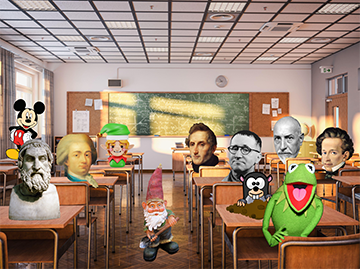Massimiliano Civica encounters the brilliant work by Samuel Beckett: «An attempt at a dialogue, the harrowing “nostalgia” and the “dream” of conversation; an apparent uninterrupted internal monologue that is, in reality, a desperate blind search for the right words with which to encounter others.»
-
Teatro Grassi
A woman (Monica Demuru) is buried in a mound of sand, first up to her waist, and then up to her neck. Her husband (Roberto Abbiati) lives in a cavity in the mound of sand, behind his wife. The play begins, the woman is wakened by a bell, smiles, and says: “Another heavenly day”. And she faces a new day, trying to manage to be happy, as we all do. «That mound of sand – states Massimiliano Civica, the three-times winner of the Ubu Award for best director – is Beckett’s stroke of genius; once its “absurd” premises are accepted, we find ourselves with a realist work, a situation and a relationship between the characters marked with an absolute and “banal” quotidianity. Beckett’s “absurdity” lies in the mound, in the choice of the initial physical situation, not in the characters or what they say. This work “extroflects” an essential condition, translating it physically to render it evident on stage; we are all blocked, incapable of looking into each other’s eyes, to move towards each other, all desperately seeking a form of contact that makes us feel less alone. »
Duration: 90’ without interval
Learn more
Booklet
ReadA woman (Monica Demuru) is buried in a mound of sand, first up to her waist, and then up to her neck. Her husband (Roberto Abbiati) lives in a cavity in the mound of sand, behind his wife. The play begins, the woman is wakened by a bell, smiles, and says: “Another heavenly day”. And she faces a new day, trying to manage to be happy, as we all do. «That mound of sand – states Massimiliano Civica, the three-times winner of the Ubu Award for best director – is Beckett’s stroke of genius; once its “absurd” premises are accepted, we find ourselves with a realist work, a situation and a relationship between the characters marked with an absolute and “banal” quotidianity. Beckett’s “absurdity” lies in the mound, in the choice of the initial physical situation, not in the characters or what they say. This work “extroflects” an essential condition, translating it physically to render it evident on stage; we are all blocked, incapable of looking into each other’s eyes, to move towards each other, all desperately seeking a form of contact that makes us feel less alone. »
Duration: 90’ without interval
Learn more
Booklet
ReadCredits
Giorni felici
by Samuel Beckett
translation Carlo Fruttero
a play by Massimiliano Civica
with Roberto Abbiati and Monica Demuru
sets Roberto Abbiati
costumes Daniela Salernitano
lighting Gianni Staropoli
a Teatro Metastasio di Prato production
by arrangement with Arcadia & Ricono Ltd by kind permission of The Estate of Samuel Beckett at Curtis Brown Group Limited
Tickets
Category of performance Hosted Shows
Stalls full price € 33 | Discounted (under 26 and over 65) € 21
Balcony full price € 26 | Discounted (under 26 and over 65) € 18
Subscriptions
The performance is available for subscription holders
To purchase a subscription online, click here
How and where to purchase
For information, click here
Organised groups and audiences
For information on tickets for organised groups:
tel. +39 02 72 333 216
email promozione.pubblico@piccoloteatromilano.it















